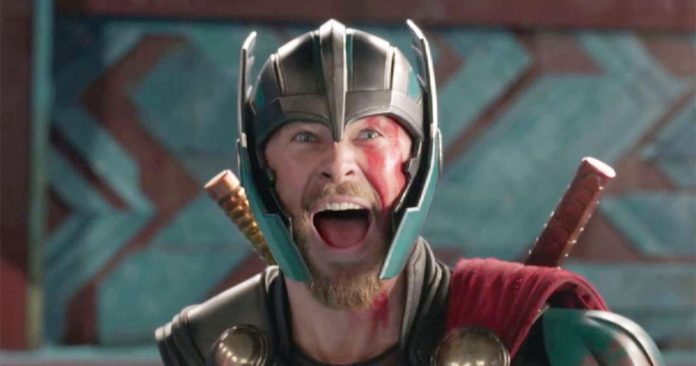The only reason I went to see Thor: Ragnarok, knowing I disliked the character, and was completely burnt out on super heroes, was because Taika Waititi was attached to the project as director. I’d seen What We Do in the Shadows, and Hunt for the Wilderpeople in the past few years, and was incredibly interested to see how he would tackle a big-budget comic book romp. Turns out the answer to that was “masterfully.”
Thor: Ragnarok isn’t laden by the “gravitas” and need to be taken seriously that other films have. It can have serious moments that build relationships and move the plot, without Iron Man’s tired melancholy, or Batman screaming “MARTHA!” Neither is it cluttered with Joss Whedon’s or James Gunn’s (directors of the Avengers and Guardians of the Galaxy series, respectively) incessant need to make you laugh, or feel nostalgic about a callback. Barring a few scenes, Ragnarok handles comedy more organically, without smarm of overt genre awareness.
I think if executed poorly, the slapstick humour and improv-style dialogue could make a film seem weightless, but in Ragnarok it fits the brightly coloured palate (the visuals in this film are leagues — pun intended — ahead of most other superhero flicks) and feels natural. These are comic book stories, and there is a rule of cool. Ragnarok isn’t trying to tell you that these stories have to be grim to be worthwhile.
However, just as much as the director’s choices, such as “Pure Imagination” from Willy Wonka playing during a tunnel indoctrination scene, the improvisation of new fan favourite character Korg (Taika Waititi himself), and the cast (Jeff Goldblum as the Grandmaster is weird and awesome), there is an overt political aspect of the film that I also found very satisfying.
Some of it trickled in as jokes; The Grandmaster (who runs a gladiatorial arena) being uncomfortable with the word slave, and instead preferring his lackeys use “prisoners with jobs.” However, it mostly comes as an overt plot element, that is the founding and success of Asgard.
The film introduces the character of Hela (Cate Blanchett), the Goddess of Death and Odin’s firstborn, who with him ravaged worlds to build up their empire before she got out of control, and Odin decided to play “the benevolent king.” They talk about the violence, the conquest, and domination over other worlds, and machinations of the throne that have been apparent since early on in the series. Whenever we see Asgard, we see its grandeur and wealth, not the blood and bones it was built upon. I’d call that a pretty blatant reference to our world now.
You dive in closer, and there is little to redeem the Asgardians — to show that they have done anything worth the price paid. They are weak-minded, and show little care for the world outside their borders. They fall in line behind the power on a throne blindly, regardless of how careless or imaginary their leaders are. They rely on others to make sacrifices and fight for them, so they can maintain the status quo. Aside from soldiers, we don’t see any industry in that city, just people milling around, as if at a cocktail party.
“Asgard isn’t a place, it’s a people” is the refrain throughout the film. Those people seem weak and feckless, and authoritarian enough that they would probably fit right into many places on Earth now — and without anyone being compelled to misinterpret and invent fake crime statistics upon their arrival.


